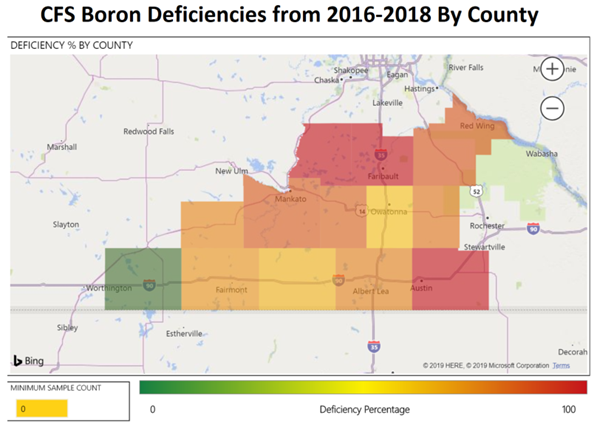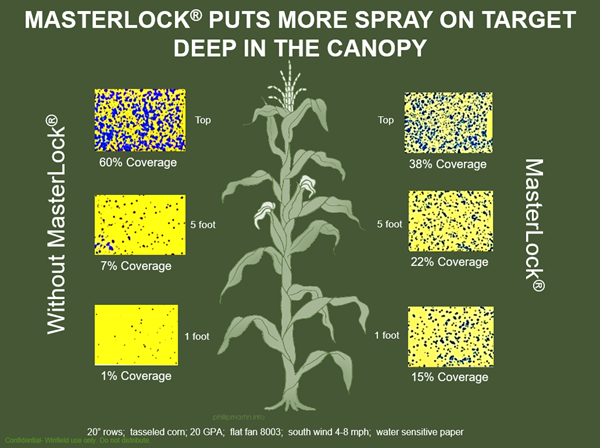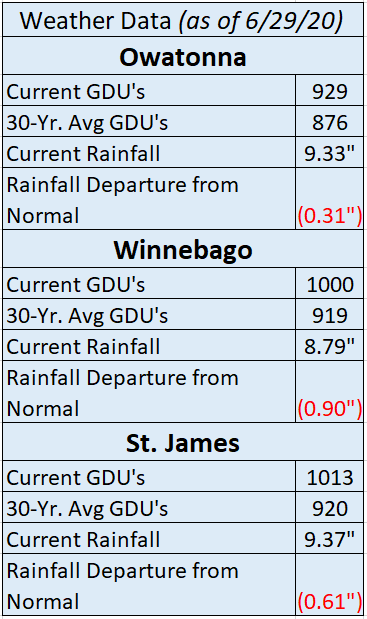2020.07.06 Growing Insights
Jul 06, 2020

|
|||
|
|
||
Nutrient Deficiencies in Corn |
|
| When significant rainfall occurs, nitrogen and sulfur losses are often the first concern because of their mobility in soils. Boron is a micronutrient needed in much smaller amounts than N or S, but it plays a key role in corn growth and development and is mobile in the soil like nitrate and sulfate. It’s also immobile in the corn plant, so the corn needs a steady supply of boron to fulfill its needs since it can’t be remobilized from older leaves to new leaves. The requirement for boron is much higher leading up to the initiation of the tassel and is essential in actively growing regions of plants. Boron is necessary for transporting water, sugar, and nutrients to growing portions of the corn plant. Boron also plays a central role in pollen viability and development of corn ear shoots, and successful pollination requires adequate boron levels. Pollen that develops on B deficient plants does not contain the starch necessary for the pollen grain to grow once it lands on a silk. Tissue samples are the best leading indicator to diagnose potential boron deficiencies. Historically, 60-75% of tissue samples taken in southern MN have shown boron deficiency or responsive levels in the last 3 years. The map below outlines the CFS area and the percent of tissue samples taken between 2016 and 2018 that came back deficient in boron. |
|
|
|
 |
| To manage boron deficiencies, foliar applications should target developing reproductive tissues to provide an adequate B supply during the critical requirement of boron as pollen grains germinate and grow. At CFS, we rely on Max-In Boron at 1 pt./acre with a fungicide tassel application to help overcome deficiencies and provide sufficient boron for pollen growth and development. Max-In Boron is unique since it contains CornSorb® Technology that increases humectancy, and helps increase more nutrient uptake into the leaf. | |
|
|
 |
Improving Corn VT Fungicide ROI |
|
| Fungicides are an important investment in corn production, and many growers will make the decision to apply a fungicide at tassel in the coming weeks. Fungicides are a “contact” chemistry and demand great coverage since they don’t readily move throughout the plant. To control diseases and insects that live below the canopy, fungicides have to be delivered lower in the canopy for improved effectiveness. Adjuvants are usually the go-to option to help active ingredients work better, but VT applications complicate the ability to use adjuvants in conjunction with fungicides since adjuvants containing NPE have been linked to Arrested Ear Syndrome. In order to maximize fungicide coverage and deposition, VT fungicide recommendations from CFS are paired with MasterLock® adjuvant. MasterLock is not formulated with NPE, so it will not contribute to arrested ear. MasterLock® adjuvant combines the proven drift and deposition of InterLock® adjuvant and DropTight™ additive, an exclusive non-ionic surfactant, to specifically enhance the performance of fungicide and insecticide applications in mid to late post applications to corn and soybeans:
|
|
|
|
 |

